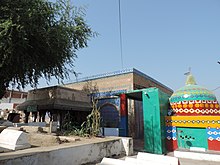| MakhdumJahaniyan Jahangasht | |
|---|---|
 | |
| Personal life | |
| Born | Mir Sayyid Jalaluddin (1308-02-08)8 February 1308 |
| Died | 3 February 1384(1384-02-03) (aged 76) Uch, Delhi Sultanate (near Bahawalpur in present-day Punjab, Pakistan) |
| Relatives | Jalaluddin Surkh-Posh (grandfather) Shah Jewna (nephew) |
| Religious life | |
| Religion | Islam |
| Sect | Sunni Islam |
| Jurisprudence | Hanafi |
Mīr Sayyid Jalāl ad-Dīn an-Naqwī al-Bukhārī (Persian: میر سید جلال الدین النقوی البخاری; 1308-1384), better known as Jahāniyān Jahāngasht (Persian: مخدوم جہانیاں جہان گشت), was a Punjabi Muslim Sufi saint from South Asia.
Biography

Jahaniyan Jahangasht was born on 8th February 1308 AD (14 Shaban 707 AH) in Uččh. His father, Sayyid Aḥmad Kabīr, was the youngest son and chosen successor of Jalaluddin Surkh-Posh of Bukhara. His father was a disciple of Rukn al-Dīn Abu ’l-Fatḥ.
He was later given the title of Jahaniyan Jahangasht from which he gained prominence. He travelled to many countries including Kāzarūn, Egypt, Syria-Palestine, Mesopotamia, Balk̲h̲, Buk̲h̲āra, K̲h̲urāsān, and visited Mecca 36 times in his life. He married the daughter of his half-uncle Sadruddin Muhammad Ghawth.
He received his k̲h̲irḳa from Naṣīr al-Dīn Čirāg̲h̲-i Dihlī. Muḥammad b. Tug̲h̲luḳ appointed Jalāl al-Dīn as S̲h̲ayk̲h̲ al-Islām and was granted forty k̲h̲ānaḳāhs in Sīwastān, but left for the Ḥajj. When he returned Fīrūz S̲h̲āh Tug̲h̲luḳ also paid him reverence, and Jalāl al-Dīn would visit Delhi periodically. Jalāl al-Dīn also accompanied the king on his campaign to Ṭhaṭṭā and was a major influence on Fīrūz's religious policies.
He visited Hazrat Pandua, the first capital of the Bengal Sultanate, where he led the janazah of Alaul Haq Pandwi, the court scholar of Bengal. The Jhan Jhaniya Mosque of the 16th-century is said to be named in his honour. Every year, during the urs of Akhi Siraj Bengali, Jahangasht's jhanda is taken from Tabrizi's dargah to Akhi Siraj's mausoleum.
Legacy

His descendants use the surname Naqvi Bukhari, and belong to the Naurang Jahania family Some of them migrated to Tando Jahania in Sindh creating a sizeable community, whilst others migrated to many other places within the subcontinent.
See also
References
- Lawrence, Bruce B. (1982). "Islam in India: The Function of Institutional Sufism in the Islamization of Rajasthan, Gujarat and Kashmir". In Ishwaran, K.; Smith, Bardwell L. (eds.). Islam in Local Contexts. Brill. pp. 27–43. doi:10.1163/9789004643833_006. ISBN 978-90-04-64383-3.
- Marat-e-Jalali (مرآت جلالی) by Syed Khalil Ahmed Bukhari Hassami, First Edition 1918, Allahabad, Second Edition 1999, Karachi.
- ^ Bazmee Ansari, A.S. (2012). "D̲j̲alāl al-Dīn Ḥusayn al-Buk̲h̲ārī". In Bearman, P.; Bianquis, Th.; Bosworth, C.E.; van Donzel, E.; Heinrichs, W.P. (eds.). Encyclopaedia of Islam, Second Edition. Brill.
- Hassami S. K. A. B. Marat-e-Jalali (Red Clothed man from Bukhara) First Edition 1918, Allahabad, Second Edition 1999, Karachi.
- Abdul Karim (1959). Social History of the Muslims in Bengal (Down to A.D. 1538). Asiatic Society of Pakistan. pp. 102–103.
- Abdul Karim (2012). "Shaikh Akhi Sirajuddin Usman (R)". In Sirajul Islam; Miah, Sajahan; Khanam, Mahfuza; Ahmed, Sabbir (eds.). Banglapedia: the National Encyclopedia of Bangladesh (Online ed.). Dhaka, Bangladesh: Banglapedia Trust, Asiatic Society of Bangladesh. ISBN 984-32-0576-6. OCLC 52727562. OL 30677644M. Retrieved 5 January 2025.
- "Safarnama Makhdoom Jahanian Jahangasht". Archived from the original on 9 November 2013. Retrieved 19 October 2020.
- "UCH Sharif Trust | Understanding of Culture and Heritage | an Ancient Tradition". Archived from the original on 18 May 2016. Retrieved 25 July 2014.
- "Sufis & Shaykhs - World of Tasawwuf". Spiritualfoundation.net. Archived from the original on 14 July 2020. Retrieved 15 July 2013.
- UNESCO World Heritage Centre. "Tomb of Bibi Jawindi, Baha'al-Halim and Ustead and the Tomb and Mosque of Jalaluddin Bukhari - UNESCO World Heritage Centre". Whc.unesco.org. Retrieved 15 July 2013.